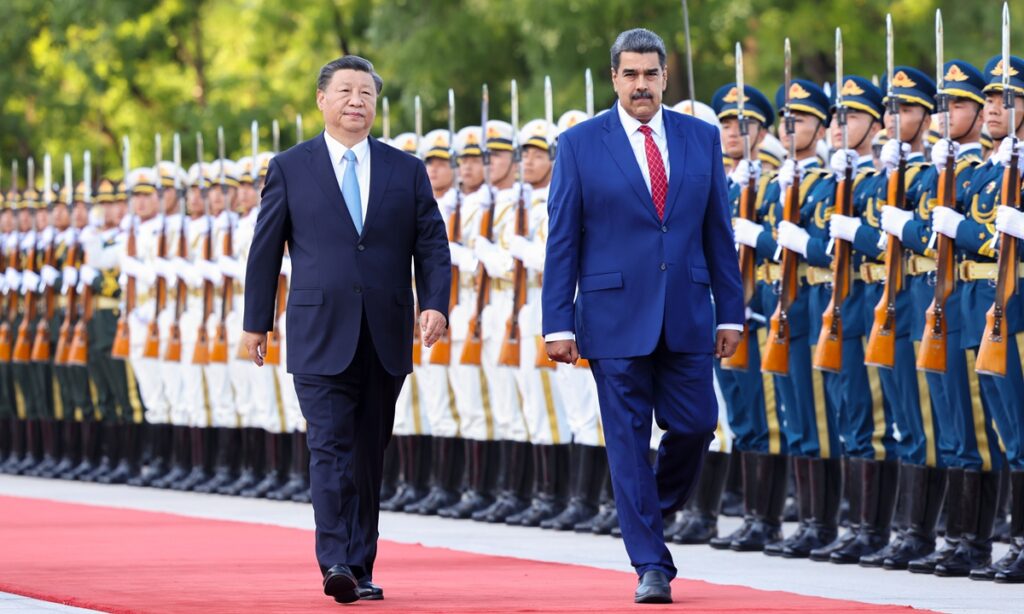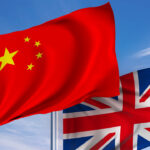Two countries signed wide-ranging cooperation docs on BRI, economy, tech etc.
Chinese President Xi Jinping and Venezuelan President Nicolas Maduro Moros jointly announced on Wednesday the elevation of the two countries’ relations to an all-weather strategic partnership. China will continue to firmly support Venezuela’s efforts to safeguard national sovereignty, dignity and social stability, as well as its just cause against external interference, Xi told visiting Maduro on Wednesday afternoon.
Chinese experts said Maduro’s seven-day “historic” visit to China marks that the bilateral relationship is entering a new stage, as the two signed cooperation agreements on jointly building the Belt and Road Initiative (BRI), and in the economic, education, technology and aerospace arenas, as well as other areas. Experts believe that the visit will unveil a new chapter of cooperation with China that will inject new impetus into Venezuela’s development, which has entered a new stage of development after weathering the impact of US sanctions and is now experiencing economic recovery.
A slew of leaders from developing countries have visited or plan to visit China lately, a sign observers believe demonstrates the global south’s confidence in China’s growth, as well as anticipation for cooperation with China. They believe it is the special appeal of China’s development model and plan for overcoming world’s common challenges that helped unite developing and emerging economies, amid rising anti-globalization and unilateralism.
China has always viewed the development of its relationship with Venezuela from a strategic and long-term perspective. We will continue to firmly support Venezuela’s efforts to safeguard national sovereignty, dignity, and social stability, as well as its just cause against external interference, Xi said.
Xi also announced with Maduro the elevation of the China-Venezuela relationship to an all-weather strategic partnership.
The establishment of an all-weather strategic partnership between China and Venezuela meets the common expectations of the two peoples and conforms to the general trend of historical development, Xi said, calling on the two sides to push for more fruitful China-Venezuela strategic cooperation, bring more benefits to the two peoples and inject more positive energy into world peace and development.
Maduro said that during his visit, everything he saw and heard fully demonstrates China’s progress and strength. He expressed gratitude for China’s valuable support and assistance provided during Venezuela’s multiple challenges of suffering from illegal unilateral sanctions and the COVID-19 pandemic.
Venezuela is willing to learn from China’s experience in building special economic zones and deepen practical cooperation in agriculture, investment, education, tourism and other fields, he said.
Maduro said Venezuela supports the joint construction of the Belt and Road. The Venezuelan side also supports the Global Development Initiative, the Global Security Initiative and the Global Civilization Initiative proposed by Xi.
The two leaders witnessed the signing of multiple bilateral cooperation agreements in the fields of the BRI, economy and trade, education, tourism, science and technology, healthcare, aerospace and civil aviation.
New chapter of ties
In the joint declaration of elevating ties, the two countries believe it is necessary for collective efforts to uphold the common values of peace, development, fairness, justice, democracy, and freedom for all humanity, oppose all forms of hegemonism and power politics, oppose all forms of unilateralism, oppose the formation of exclusive cliques targeting specific countries.
They agreed to accelerate the signing of the cooperation documents for joint construction of the BRI. China and Venezuela signed a Memorandum of Understanding (MOU) for cooperation on the BRI on September 14, 2018.
The two countries also signed agreements on investment, agreed to deepen legal exchanges and deepen cooperation on energy, finance, trade, investment, digital economy and other fields, as well as encourage the two countries’ airlines to open flights on the China-Venezuela route in a timely manner based on market needs.
Venezuela reiterated its interest in joining the BRICS, and vowed to make contributions as a reliable energy supplier with the country’s large oil and natural gas reserves.
Xu Shicheng, a research fellow at the Institute of Latin American Studies under the Chinese Academy of Social Sciences, told the Global Times that in recent years, China’s relationship with Venezuela witnessed rapid development with both sides reaching agreements on lunar exploration, big data and other areas. “The two countries share a high degree of mutual trust. This visit will bring bilateral ties to a new stage,” Xu said.
Venezuela has suffered from illegal unilateral sanctions from the US and its allies, which exerted a heavy blow to the South American country’s development. However, Venezuela’s economy began to pick up in 2021, and its surrounding diplomatic environment is less hostile, Xu said, noting that cooperation with China can inject new impetus into Venezuela’s economic recovery.
Since last year, Colombia began mending fences with Venezuela, including signing an unprecedented bilateral investment treaty in February this year that evidences the marked improvement in their relations.
Appealing experiences, plans
Maduro’s visit overlapped with visits of leaders from other developing nations, including Zambian President Hakainde Hichilema, who kicked off his visit to China on Sunday and new Cambodian Prime Minister Hun Manet, who will pay an official visit to China from Thursday to Saturday.
The slew of visits reveals that developing countries have extremely high expectations of boosting their development via cooperation and learning from China’s experience, when the world economic recovery remains sluggish despite shaking off the COVID-19 paralysis, Song Wei, a professor at the School of International Relations and Diplomacy at Beijing Foreign Studies University, told the Global Times.
She said the facts also corroborate that most developing countries are confident about China’s growth and openness. “China’s continuing opening-up amid anti-globalization and geopolitical tussles has certainly infused confidence into the world,” Song said, noting that developing countries’ recognition also serves as rebuttal for the “China’s economic collapse” hype that is popular among some Western countries.
Interestingly, those leaders’ visits are not confined to the capital Beijing. Maduro visited a number of Chinese cities including Shenzhen in South China’s Guangdong Province, Shanghai and Jinan, East China’s Shandong Province.
When asked why he chose Shenzhen as the first stop of his trip, Maduro said, “For those who are looking for development, technology and new inventions, Shenzhen is an important place, so it is a good starting point,” according to a report by the Shenzhen Special Zone Daily.
China’s tech hub also hosted Zambian President Hakainde Hichilema, who stayed in Shenzhen from Sunday to Tuesday. Hichilema visited tech companies Tencent and ZTE on Tuesday in Shenzhen.
Cooperation and development are the pillars of ties with developing countries. For a long time China has provided assistance for those countries, yet as the tide of globalization has changed and those countries are facing more hurdles in developing than ever, China is now offering a more “sustainable” assistance and imparting the Chinese experience to those countries, according to Song.
And it is not only China’s development model, but the China-proposed initiatives for challenges that the international society faces, such as the Global Development Initiative, the Global Security Initiative,and the Global Civilization Initiative, which have received wide praise from developing countries, said experts.
In an exclusive interview with Xinhua, Maduro said that today the international community is facing a historic opportunity to help usher in a multipolar world, where no single country or group dominates.
Dozens of emerging nations are helping humanity reunite, and regain its rights to happiness, equality, freedom, and democracy, he said, hailing China as at the forefront of those efforts.
(Global Times)




